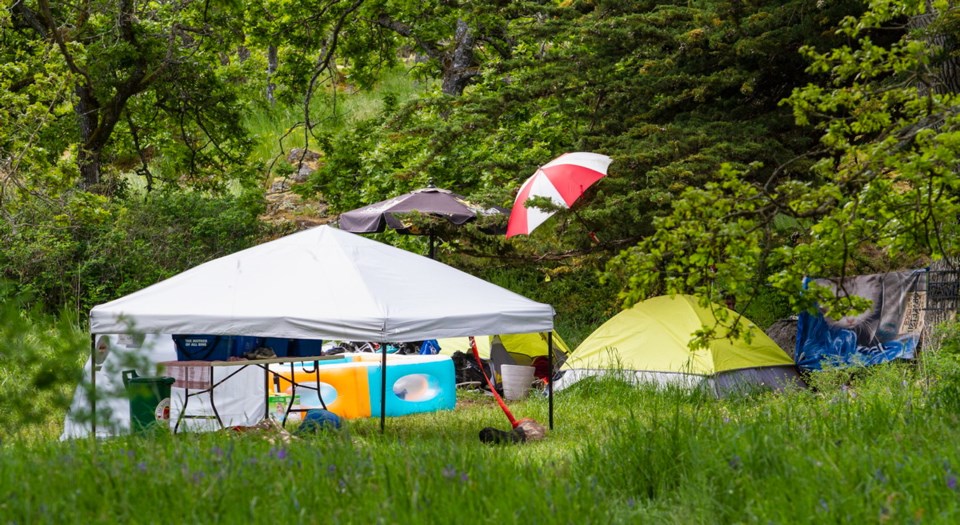Victoria will begin booking hotel and motel rooms for people living in Beacon Hill Park and elsewhere who were left behind when the province moved more than 300 people indoors from camps at Topaz Park and Pandora Avenue.
City councillors approved a motion Thursday that directs staff to secure rooms anywhere in the capital region using a previously approved $300,000 fund.
The bookings will be contingent on staff working with partner groups to provide support for people once they move indoors.
In addition, councillors instructed staff to keep a number of washrooms and handwashing stations open on a 24-hour basis near outdoor sheltering locations so that people can maintain proper hygiene during the COVID-19 outbreak.
“Ideally, B.C. Housing would be leading this,” said Coun. Ben Isitt, the motion’s lead author. “The fact is, they’re not. There’s at least an unmet need of approximately 200 units.
“So this is about the city showing some leadership to help fill that void … and, hopefully, helps move the province into allocating the resources and exercising its responsibility.”
It’s unclear how many people remain on the street. The city is conducting a census to try get a handle on the numbers, but estimates 90 people are camping in Beacon Hill Park, with more at other locations.
The Victoria Inner City COVID Response team of medical professionals says there are still at least 300 people on the street who were not at Topaz or Pandora when the province issued its April 25 order to evacuate the camps.
“We have not even begun to reach the amount of folks that we knew were unhoused in the city of Victoria,” Coun. Sarah Potts said. “I don’t think anyone is expecting for us to house everyone tomorrow, but the fact of the matter is homelessness is unacceptable and we need to be looking to end it.”
Coun. Geoff Young supported part of the motion that called on the provincial government to provide housing with supports for everyone without homes in the province.
But he objected to the city renting hotel and motel rooms, noting the lengths B.C. Housing had to go to find enough spaces and the guarantees it offered hotel owners about restoring rooms to their previous conditions.
He warned, too, that the city was once again sending the wrong signals in its response to the homelessness issue.
“Sending out the message: ‘Come to Victoria, get a free hotel room!’ is working against everything we want to achieve — not just for the people who live permanently in Victoria, but even for the people that we’re attracting.”
Potts objected to Young’s suggestion that the city is drawing homeless people from other jurisdictions.
“We’ve heard from bylaw [staff] several times that they’re not seeing a massive influx of people,” she said.
City manager Jocelyn Jenkyns told council that bylaw officers and parks officials are already contacting people living in Beacon Hill Park and putting together a new list of names.
“We’re sharing those names with B.C. Housing,” she said. “So we’re taking the same approach that was taken on Pandora and Topaz.”
People will be assessed to see what form of housing they need, Jenkyns said. In addition, the city is working with non-profit agencies to determine how best to provide food, hygiene, harm reduction and other services.
Dr. Kelsey Roden, a family physician with the Victoria Inner City COVID Response team, welcomed the progress that has been made to house people in hotels with supports. But she urged officials to modify the approach that was used at Pandora and Topaz.
“We feel very strongly that the same methods to get people into the hotels should not be used, primarily because there was a lot of confusion for our campers,” she said. “And, frankly, it hasn’t worked for the people who are still out there.”
Roden said erecting fences around some of the tents and using police to shut down the Pandora camp was traumatizing for clients, many of whom are now living in Beacon Hill and other parks.
“From a medical perspective, that dispersal has increased risk of overdose, of isolation for these folks,” she said. “It’s harder to access and to provide wrap-around services.
“And there’s been a lot of distrust and confusion sown from the campers’ perspective toward authority and so that makes our job more challenging as physicians.
“Certainly our hope is that those methods — specifically that enforcement method — will not be used.”
Roden said that it’s important to involve the campers themselves early in the planning process.
“Success might be challenging without their voice.”



